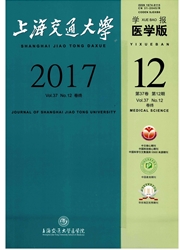

 中文摘要:
中文摘要:
前列腺癌是一种激素相关的恶性肿瘤,其与肥胖在流行病学及分子机制方面的关系密切。脂联素是脂肪细胞合成分泌的一种脂肪细胞因子,以内分泌的形式作用于全身各个器官,有抗炎、胰岛素增敏、抗增殖和促进凋亡等作用。肥胖可造成脂联素水平的降低,而脂联素作用的下降与多种肿瘤的发生有密切联系。研究发现前腺癌患者血清脂联素水平下降,前列腺癌组织中脂联素受体下调,提示脂联素及其受体的功能缺陷可能与前列腺癌的发生、发展有关。该文主要对脂联素和脂联素受体的功能、信号通路及其在前列腺癌诊断、治疗和预后中的作用进行综述。
 英文摘要:
英文摘要:
Prostate cancer is a hormone-associated malignancy and is closely related to obesity in terms of epidemiology and molecular mechanisms. Adiponectin, an adipocytokine produced by adipokine and secreted by adipocyte, exhibits anti-inflammatory, insulin-sensitizing, anti-proliferation, and proapoptosis actions on various organs in an endocrine form. Obesity leads to a decrease in adiponectin level, which is closely associated with the occurrence of many tumors. Studies have showed that prostate cancer patients had lower serum adiponectin levels and decreased expression of adiponectin receptors in tumor tissues, which suggest that functional defects of adiponectin and its receptors may be relevant to the occurrence and development of prostate cancer. This paper reviews adiponectin and its receptors’ functions, signaling pathways, and roles in diagnosis, treatment, and prognosis of prostate cancer.
 同期刊论文项目
同期刊论文项目
 同项目期刊论文
同项目期刊论文
 Two-stage urethroplasty is a better choice for proximal hypospadias with severe chordee after urethr
Two-stage urethroplasty is a better choice for proximal hypospadias with severe chordee after urethr Normal peripheral prostate stromal cells stimulate prostate cancer development: roles of c-kit signa
Normal peripheral prostate stromal cells stimulate prostate cancer development: roles of c-kit signa RNAi-mediated knockdown of vascular endothelial growth factor inhibits vascularization and tumor gro
RNAi-mediated knockdown of vascular endothelial growth factor inhibits vascularization and tumor gro 期刊信息
期刊信息
